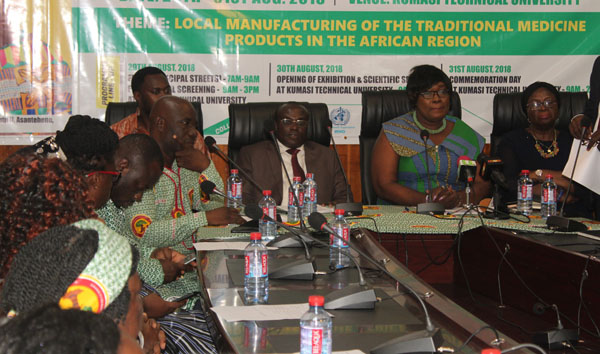A section of GHAFTRAM executives and dignitaries at the media launch of the event
Ghana Federation of Traditional Medicine Practitioners Association (GHAFTRAM) has appealed to government, through the Minister of Health (MoH), to include accredited traditional medicine facilities as service providers of the National Health Insurance Scheme (NHIS).
The association also called for the inclusion of traditional medicines on the medicines list of the NHIS.
“We have, on several occasions, made appeals for our accredited facilities and medicines to be added to the NHIS but they do not listen,” the National Organiser of GHAFTRAM, Nana Kwadwo Obiri, said.
He acknowledged the fact that some hospitals have alternative medicine treatment but added that the services are not covered under the health scheme.
Mr Obiri said the association believes it is high time patrons of traditional medicine facilities also benefitted from the national health policy despite their treatment option.
The GHAFTRAM national organiser further called for the constitution of the governing board of the Traditional Medicines Practitioners Council (TMPC) as soon as possible.
He said without a functioning board, it is difficult pushing for actions that would enhance traditional medicine practice in the country.
These appeals were made at the launch of the 19th Traditional Medicine Week of Ghana and the 16th African Traditional Medicine Day in Accra.
Deputy Health Minister Kinsley Aboagye-Gyedu, in response to the appeals, assured GHAFTRAM that their concerns would be addressed as a policy decision.
Commenting on the constitution of the governing board, Mr Aboagye-Gyedu said the ministry has made significant progress in its constitution and would soon be inaugurated.
Dr. Anastasia Yirenkyi, director of Traditional & Alternative Medicine Division of the Ministry of Health (MoH), added that traditional medicine has seen various improvements and progress over the years.
She said the ministry, however, seeks to protect the health of its citizens by strengthening the regulatory agencies to ensure quality, safety and efficacy of medical products and services, including herbal medicinal products in the country.
“Following the current sustained improvements in quality control and regulatory measures, it is envisaged that in the near future, Ghana would take hold of regulation of all health products and services to ensure safety, quality and efficacy,” Dr. Yirenkyi pointed out.
By Jamila Akweley Okertchiri


